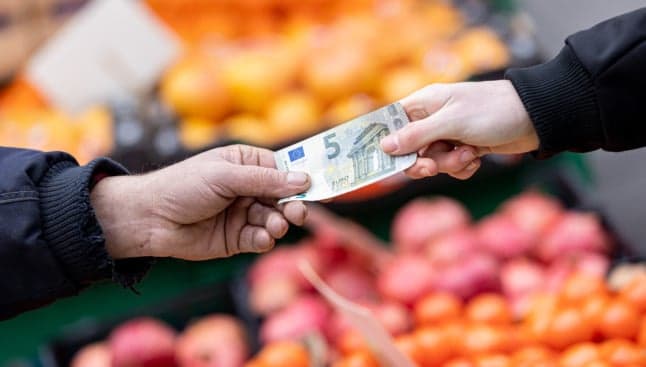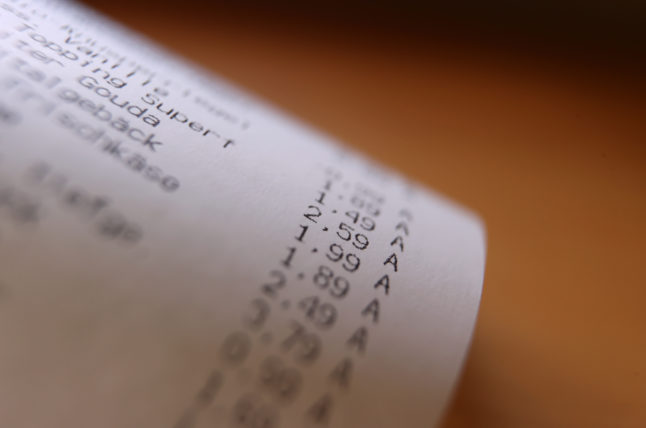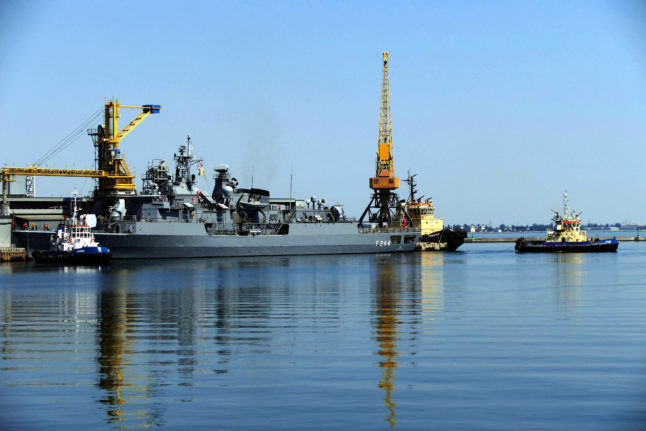When will Germany's rising cost of living slow down?

German consumer prices are increasing at record rates, leading to worries about a repeat of the so-called 'stagflation' of the 1970s. Why are experts worried - and when will inflation become more stable?
What's happening?
It's something most of us are noticing almost every day - whether it's increasing prices at the supermarket or at the gas station.
After years of German inflation barely moving, Russia’s invasion of Ukraine has quickly pushed up German consumer prices.
In April, inflation hit a 40-year high rate of 7.4 percent, driven largely by higher energy costs. At the same time though, the government has slashed its 2022 growth forecast from 3.6 percent in January to just over 2 percent now. German economists say neither problem is likely to go away soon.
READ ALSO: Five ways Germany’s soaring inflation could affect your life
Has inflation ever increased like this before?
Experts are worried about a phenomenon that happened in the 1970s occurring again in Germany.
When high inflation and low growth go together, economists call it stagflation. A mix of the words “stagnation” and “inflation,” it describes the toxic mix of a slowing economy, possibly with more people losing their jobs - at the same time as the cost of living goes up.
Managing director of the Munich Ifo Institute, Clemens Fuest, told Bavarian broadcaster BR24: "With stagflation, goods become scarce. In this case, it is mainly energy that is in short supply, and this drives up prices. And the only way politicians can react to this is by giving targeted aid to those who are hardest hit, which is then borne by everyone together."

A German supermarket receipt. Prices have been rising intensely in recent months. Photo: picture alliance/dpa | Karl-Josef Hildenbrand
In the early 1970s, tensions over the Yom Kippur War led to Middle East embargoes that pushed oil prices up abruptly, leading to stagflation.
At first, oil prices rose by 70 percent and then by 300 percent at its peak. Inflation rose to seven percent in Germany, which was heavily dependent on oil from the Middle East. Car-free Sundays and speed limits on German roads followed.
However, the economy stopped growing and within two years unemployment figures rose significantly. Companies passed on their increased costs to consumers, who in turn demanded higher wages, which the trade unions then implemented. This led to the a wage-price spiral.
In Germany, the Bundesbank reacted relatively quickly with a restrictive monetary policy - it raised interest rates. Inflation fell to 2.7 percent by 1978 before shooting up again in the early 1980s. Unemployment also peaked at 9.1 percent during this period. During the 1980s, the economy recovered and had growth rates of 2 to 3 percent.
In the USA, on the other hand, inflation rose to 20 percent and could only be brought down by a radically restrictive monetary policy of the central bank, with an increase in the base rate (the central bank's interest rate) to 20 percent. The result, however, was a deep recession and high unemployment.
READ ALSO: How the cost of living crisis is changing German spending habits
It's clear that stagflation is difficult to combat in terms of economic policy. In the US, this issue has been discussed recently.
According to Harvard economics professor and former chief economist of the International Monetary Fund, Kenneth Rogoff, there's a high risk of this happening due to a perfect storm of struggling economies, the war in Ukraine and worldwide supply issues.
German Finance Minister Christian Lindner has also been warning of stagflation. And the fear is real, according to Ifo head Clemens Fuest.
"In other economic crises, it's usually the case that demand declines," Fuest said. "So consumers are worried about the future, they buy less or people become unemployed.
"Then the state can intervene, monetary policy can increase demand. But that doesn't work here. It is not a lack of demand, but a lack of supply. And that's why the usual instruments of economic policy don't work here, the state can't do very much."
How long will we see rocketing prices in Germany?
European governments are moving to wean themselves off Russian coal, gas, and oil as quickly as possible - in order to both sanction Russia for invading Ukraine and to stop financing Putin’s regime with European money. But there aren’t enough alternatives to Russia energy in Europe yet, and that’s pushing up energy prices.
At the same time, Ukraine is one of the world’s major producers of key agricultural products like grain and soybean oil. Russia’s blockade of the Port of Odessa has caused grain and soybean oil prices to spike, simply because Ukrainian ships carrying produce to world markets can’t leave safely.
READ ALSO: What to know about the latest price hikes in German supermarkets

A freight ship leaves the Port of Odessa. Photo: picture alliance/dpa/Ukrinform | -
Experts say consumer prices will become stable in Germany, but it depends on the world situation.
Alexander Kriwoluzky, Head of Macroeconomics at the German Institute for Economic Research, told The Local that spiralling inflation is not the "new normal."
"But I think we will see high prices this year and next,” he said.
Kriwoluzky says determining what effect these events will have on prices is less a matter of when these events end, but how.
"It could well be that we find different ways of exporting grain out of Ukraine. If the European Union is successful at securing a safe energy supply that doesn’t rely on Russia, we could see prices come down a little then too," he said.
Aside from the war, Kriwoluzky says China’s zero-Covid policy is also having a knock-on effect on German prices, as strict lockdowns have stalled deliveries and left European companies short of supplies.
Unless China eases its lockdown, possibly through greater vaccination, prices in Germany are likely to keep climbing for a while.
Comments
See Also
What's happening?
It's something most of us are noticing almost every day - whether it's increasing prices at the supermarket or at the gas station.
After years of German inflation barely moving, Russia’s invasion of Ukraine has quickly pushed up German consumer prices.
In April, inflation hit a 40-year high rate of 7.4 percent, driven largely by higher energy costs. At the same time though, the government has slashed its 2022 growth forecast from 3.6 percent in January to just over 2 percent now. German economists say neither problem is likely to go away soon.
READ ALSO: Five ways Germany’s soaring inflation could affect your life
Has inflation ever increased like this before?
Experts are worried about a phenomenon that happened in the 1970s occurring again in Germany.
When high inflation and low growth go together, economists call it stagflation. A mix of the words “stagnation” and “inflation,” it describes the toxic mix of a slowing economy, possibly with more people losing their jobs - at the same time as the cost of living goes up.
Managing director of the Munich Ifo Institute, Clemens Fuest, told Bavarian broadcaster BR24: "With stagflation, goods become scarce. In this case, it is mainly energy that is in short supply, and this drives up prices. And the only way politicians can react to this is by giving targeted aid to those who are hardest hit, which is then borne by everyone together."

In the early 1970s, tensions over the Yom Kippur War led to Middle East embargoes that pushed oil prices up abruptly, leading to stagflation.
At first, oil prices rose by 70 percent and then by 300 percent at its peak. Inflation rose to seven percent in Germany, which was heavily dependent on oil from the Middle East. Car-free Sundays and speed limits on German roads followed.
However, the economy stopped growing and within two years unemployment figures rose significantly. Companies passed on their increased costs to consumers, who in turn demanded higher wages, which the trade unions then implemented. This led to the a wage-price spiral.
In Germany, the Bundesbank reacted relatively quickly with a restrictive monetary policy - it raised interest rates. Inflation fell to 2.7 percent by 1978 before shooting up again in the early 1980s. Unemployment also peaked at 9.1 percent during this period. During the 1980s, the economy recovered and had growth rates of 2 to 3 percent.
In the USA, on the other hand, inflation rose to 20 percent and could only be brought down by a radically restrictive monetary policy of the central bank, with an increase in the base rate (the central bank's interest rate) to 20 percent. The result, however, was a deep recession and high unemployment.
READ ALSO: How the cost of living crisis is changing German spending habits
It's clear that stagflation is difficult to combat in terms of economic policy. In the US, this issue has been discussed recently.
According to Harvard economics professor and former chief economist of the International Monetary Fund, Kenneth Rogoff, there's a high risk of this happening due to a perfect storm of struggling economies, the war in Ukraine and worldwide supply issues.
German Finance Minister Christian Lindner has also been warning of stagflation. And the fear is real, according to Ifo head Clemens Fuest.
"In other economic crises, it's usually the case that demand declines," Fuest said. "So consumers are worried about the future, they buy less or people become unemployed.
"Then the state can intervene, monetary policy can increase demand. But that doesn't work here. It is not a lack of demand, but a lack of supply. And that's why the usual instruments of economic policy don't work here, the state can't do very much."
How long will we see rocketing prices in Germany?
European governments are moving to wean themselves off Russian coal, gas, and oil as quickly as possible - in order to both sanction Russia for invading Ukraine and to stop financing Putin’s regime with European money. But there aren’t enough alternatives to Russia energy in Europe yet, and that’s pushing up energy prices.
At the same time, Ukraine is one of the world’s major producers of key agricultural products like grain and soybean oil. Russia’s blockade of the Port of Odessa has caused grain and soybean oil prices to spike, simply because Ukrainian ships carrying produce to world markets can’t leave safely.
READ ALSO: What to know about the latest price hikes in German supermarkets

Experts say consumer prices will become stable in Germany, but it depends on the world situation.
Alexander Kriwoluzky, Head of Macroeconomics at the German Institute for Economic Research, told The Local that spiralling inflation is not the "new normal."
"But I think we will see high prices this year and next,” he said.
Kriwoluzky says determining what effect these events will have on prices is less a matter of when these events end, but how.
"It could well be that we find different ways of exporting grain out of Ukraine. If the European Union is successful at securing a safe energy supply that doesn’t rely on Russia, we could see prices come down a little then too," he said.
Aside from the war, Kriwoluzky says China’s zero-Covid policy is also having a knock-on effect on German prices, as strict lockdowns have stalled deliveries and left European companies short of supplies.
Unless China eases its lockdown, possibly through greater vaccination, prices in Germany are likely to keep climbing for a while.
Join the conversation in our comments section below. Share your own views and experience and if you have a question or suggestion for our journalists then email us at [email protected].
Please keep comments civil, constructive and on topic – and make sure to read our terms of use before getting involved.
Please log in here to leave a comment.